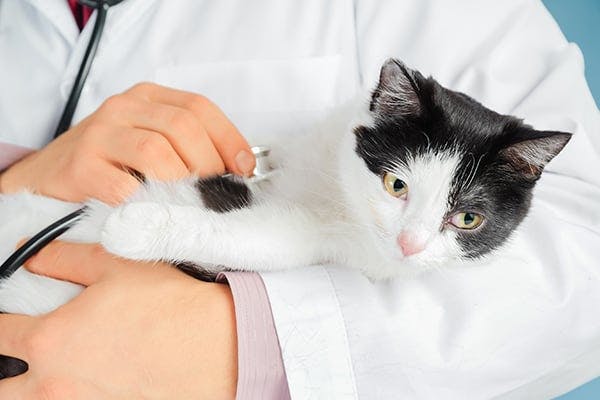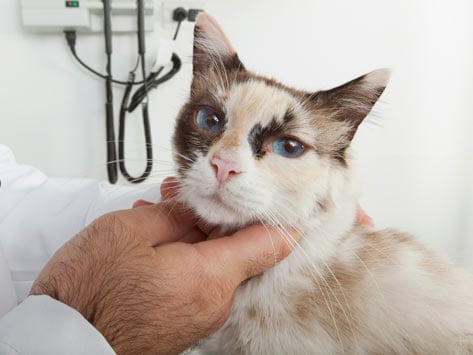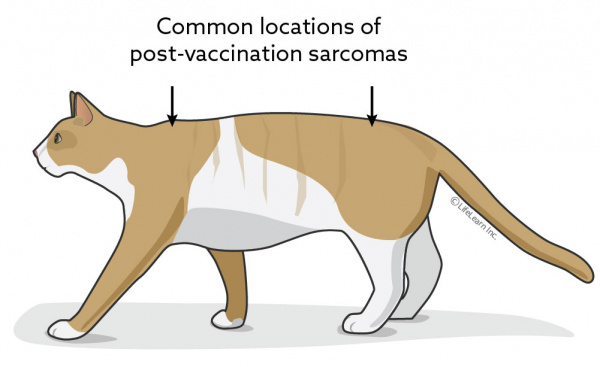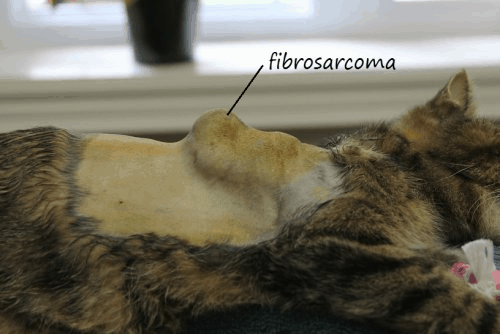fibrosarcoma in cats symptoms
This may be firm poorly circumscribed irregular and measure between 1-15cm. How To Know If Its Time To Call The Vet.

The 3 Most Common Cancers In Cats
Some of the most common symptoms are.

. Up to 10 cash back Fibrosarcoma Symptoms The most common and apparent symptom of fibrosarcoma in cats and dogs is a lump which at times may be accompanied by ulceration and bleeding. If you see it in your pet take them to a veterinarian to get a proper diagnosis. Fibrosarcoma is typically characterized by a surface-level skin growth.
Lumps may or may not be painful. Get NHVs most useful pet cancer supplements in one holistic pack. There will usually be other accompanying symptoms to an oral fibrosarcoma such as tooth loss excessive drooling and inability to eat.
Eventually as the cancer progresses cats with fibrosarcomas will develop these symptoms. Symptoms and Type Excess salivation Bad breath halitosis. Systemic Symptoms If your cats fibrosarcoma has metastasized or is untreated your cat will likely exhibit systemic symptoms beyond the lump such as lethargy decreased appetite difficulty breathing and pain.
Ad Help your pet cope with symptoms like nausea loss of appetite and energy. They most often affect the skin. A weakened immune system and weight loss in your felines are other symptoms of this disease.
Loss of Appetite and Weight. Gender appears to play some role with male cats being seen for gingival tumors more often that female cats. It is not yet fully understood how fibrosarcoma develops in cats.
Cats with oral fibrosarcomas may have difficulty eating and swallowing bad breath and drool. Symptoms of fibrosarcoma in cats. Often the first sign of feline fibrosarcoma is a lump under the skin and might be where they had received their vaccine.
The symptoms of nasal fibrosarcoma include the following. The symptoms that instead manifest themselves later when the fibrosarcoma in the cat becomes evident and bulky can be the following. Cats with oral fibrosarcomas may have difficulty eating and swallowing bad breath and drool.
In its early stages a fibrosarcoma usually does not cause any obvious signs or symptoms. Possible Causes of Fibrosarcoma in Cats. This may or may not increase in size.
They are most commonly associated with the rabies vaccine and the vaccine for feline leukemia virus. Ask your surgeon about the specifics about your cats. If you notice any of these symptoms take note of them and bring your pet.
It is important to note that things like weight loss could also be symptomatic of other issues. Localised soft tissue swelling. In some rare cases a fibrosarcoma tumor originates in the bone weakening the structure of the bone and possibly.
Your pet may display an unusual lump or mass on any part of. The lump will be firm and attached to the surrounding area and it will be hard to feel the edges. Pain around the affected area.
Symptoms can vary depending on the location of the tumour but may include. Tumors that are large and treated aggressively with radiation surgery and chemotherapy still have a fairly good prognosis however some cats can have either reoccurrence or metastasis. Ulceration may develop in advanced cases.
Symptoms can vary depending on the location of the tumour but may include. A lump or swelling. They can appear as multiple nodules in the skin or as a solid swelling or plaque.
Inability to walk and move Pain around the affected area Presence of lumps Broken bones Swollen areas of the affected body. A leukemia infection for example can cause cancer one more reason to protect your cat against this. Lumps may or may not.
Cats that are treated with aggressive surgery at the first diagnosis have the best chance of survival. Vaccine associated fibrosarcomas are tumors that arise at sites where cats have been vaccinated. Some of the most common symptoms are.
It will increase in size very rapidly. Malignant tumors usually develop on parts of the body that have been particularly stressed by infections inflammation or irritation. Symptoms of fibrosarcoma in cats Feline fibrosarcoma can occur at any age but it is most common in senior and middle-aged cats.
Call 530-752-1393 to schedule an appointment with the Oncology Service. Fibrosarcoma of the Bone in Cats. This occurs specially if a tumor presses on surrounding nerves or muscles.
Nodules near areas where injections are given. Fibrosarcoma tumors are typically firm but fleshy and adhere rigidly to their underlying tissues. Open Sores and Discharge.
Discharge from the nose or eyes. Lameness or Difficulty Moving. The lump is initially very small and is usually first observed when the cat is being stroked.
However over time the following symptoms may arise. Ad Signs Your Cat Is Sick Through Behaviors Whats In The Litter Box. Bleeding from the nose or eyes.
Inability to walk and move. Fibrosarcoma is normally a tumor that originates in the soft tissue a result of abnormal division of fibroblast cells the cells that are most prevalent in the connective tissue of the body. Swollen areas of the affected body.
This may be firm poorly circumscribed irregular and measure between 1-15cm. Localised soft tissue swelling. In fact fibrosarcoma has been deemed the most common tumor type of cats.
Fibrosarcoma in cats can present a number of symptoms. In cats however fibrosarcoma tumors are more prevalent. Other common symptoms include swelling of the affected area and pain when the area is touched.
Swelling on the cats skin. We continue to give these vaccines because of the relatively high risk of. Cats that are afflicted with gingival fibrosarcomas are on average seven and a half years old but these tumors have been seen in cats from the age of six months to fifteen years.

Fibrosarcoma Bone Cancer In Cats Symptoms Causes Treatments Cattime

Fibrosarcoma In Cats And Dogs Petcarerx

Fibrosarcoma Bone Cancer In Cats Symptoms Causes Treatments Cattime

Cat Injection Site Sarcoma The Risks Treatment Prognosis Of This Deadly Tumor Our Pet S Health

Tumor Related To Vaccinations In Cats Petmd

Post Vaccination Sarcoma In Cats Vca Animal Hospitals

Feline Injection Site Sarcoma Today S Veterinary Practice
Fibrosarcoma In Cats Symptoms Diagnosis Treatment Innovet Pet

Managing Fibrosarcoma In Cats And Dogs Mommy S Memorandum

Fibrosarcoma In Cats Causes Symptoms And Treatment

Feline Injection Site Sarcomas The Veterinary Nurse

Fibrosarcoma In Cats Symptoms Causes Diagnosis Treatment Recovery Management Cost


/GettyImages-11673268481-ff230807a7e04e2db8e38e148edb19a5.jpg)
